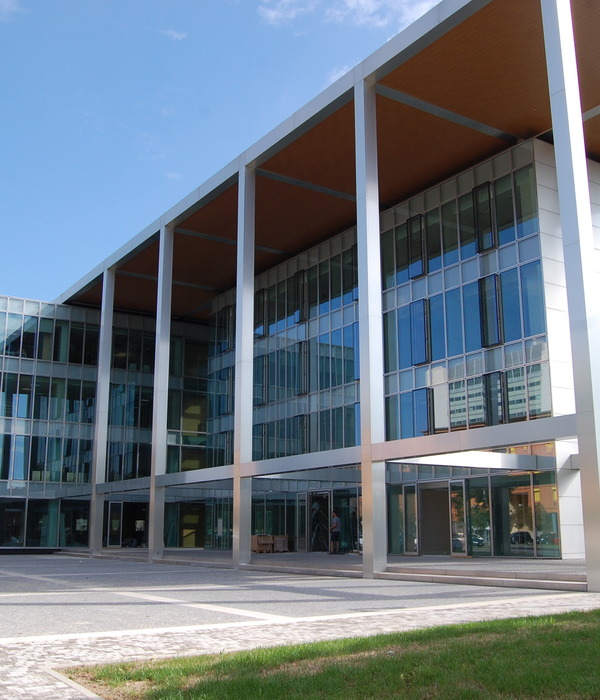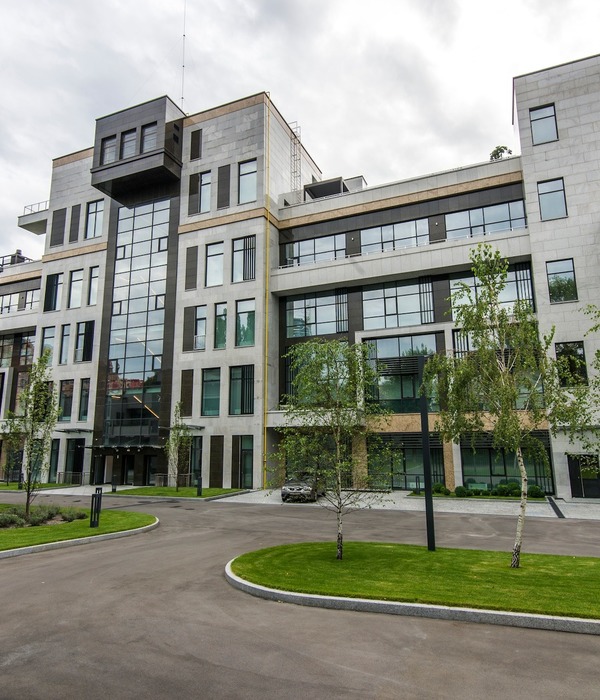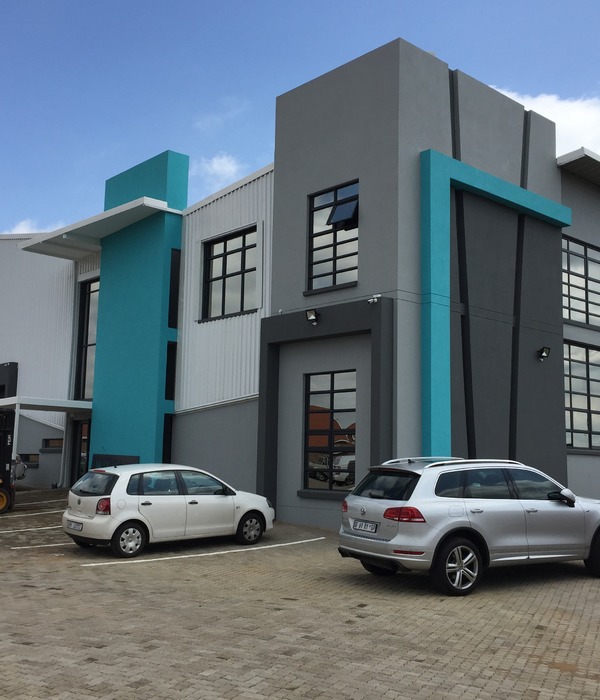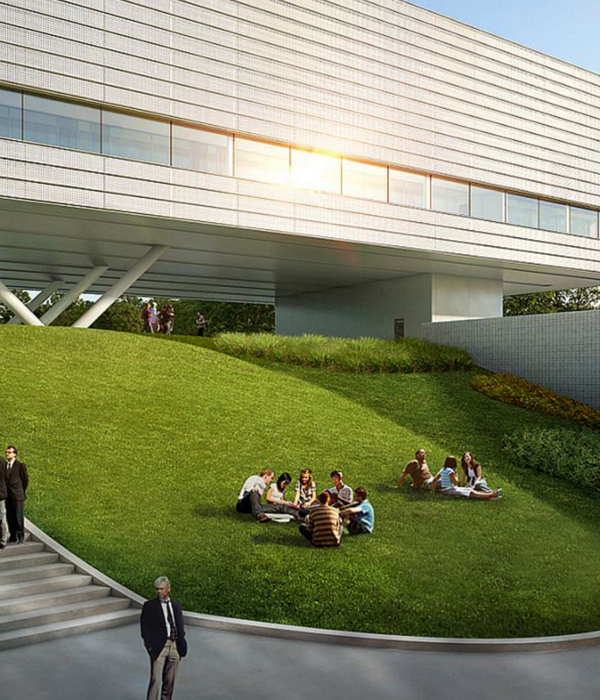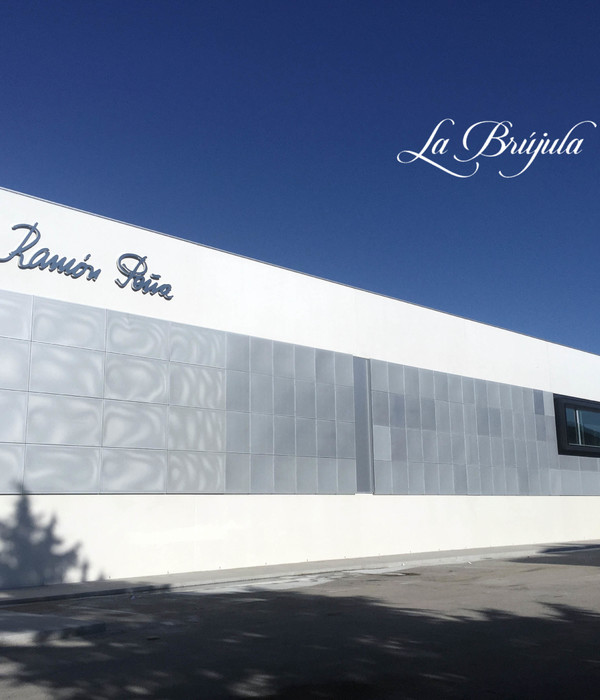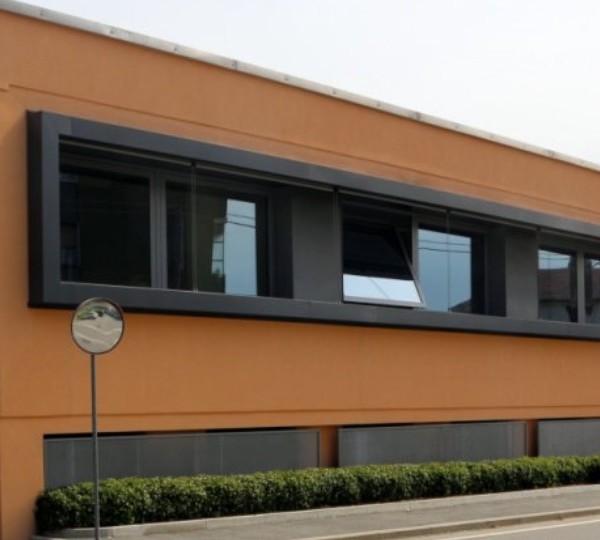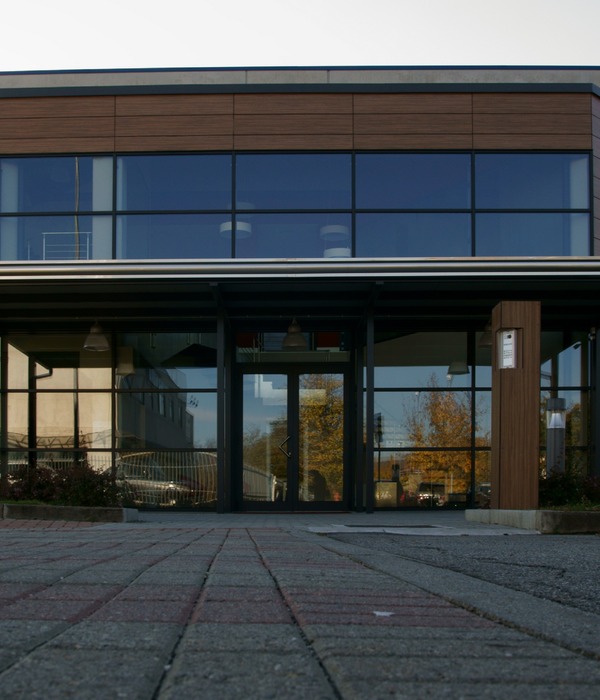更多关于白色巨树的项目前情,请点击:白色巨树,法国 / 藤本壮介建筑设计事务所,Nicolas Laisné Associés and Oxo Architects For more information about The White Tree, please click:White Tree , Montpellier, France by Sou fujimoto, Nicolas Laisné Associés and Oxo Architects
2013 年,法国南部的城市蒙彼利埃(Montpellier)的市议会举办了一个名为“Folie Richter”的竞赛。这个竞赛旨在寻找一种地标性的新型塔楼原型,丰富当地的建筑形式。在竞赛要求中,RFP 强调了该项目作为一个宏大设想所需要达到的要求:它必须能够融入其周边环境,同时内部包括一系列商业和居住空间。这也就要求本项目需要由具有创新精神的年轻建筑师和经验丰富的团队共同完成。
In 2013, Montpellier city council launched the “Folie Richter” competition. It sought to identify a blueprint for a beacon tower to enrich the city’s architectural heritage. The RFP stressed the desire for a bold project that had to fit into its environment and include shops and homes. The brief was clear: city hall wanted a team made up of a young architect working with an experienced colleague…▼白色巨树外观远景,distant exterior view of the white tree
为了这个竞赛,Manal Rachdi 和 Nicolas Laisné这两位有着自己的事务所的建筑师决定去拜访一下日本建筑师藤本壮介。虽然他们在建筑的表现方式上迥然不同,但他们的设计出发点是相同的,即从自然中汲取灵感。因此,在本项目中,三个设计团队可以相互补充,共同创造出一个令人眼前一亮的建筑结构。为了使这个项目能够顺利地推进下去,Manal Rachdi、Nicolas Laisné和他年轻的合伙人 Dimitri Roussel 于 2013 年的夏天专门飞去了东京。五天之后,最终集结的设计团队驻扎在藤本壮介的事务所里,开始了紧锣密鼓的设计和讨论工作。藤本壮介建筑设计事务所法国分部的现任负责人兼合伙建筑师 Marie de France 是本次合作的中坚力量,促进了东京和巴黎团队之间的沟通和交流。为了这个项目,所有的参与者都全力以赴,在一个开放的、放松的氛围中画着草图。
为了探讨高层塔楼的新形式,设计团队专注于人体尺度,在建筑的底层和顶层都创造了一系列公共空间:首层是一个由玻璃墙体限定出来的空间,通向街道;而屋顶则设有一个对公众开放酒吧和一个专门为住户设计的公共空间,因此,即使是住在底层的住户,也能像高层的住户一样,享有绝美的景观视野。
Manal Rachdi and Nicolas Laisné, who each run their own practices, decided to call on the Japanese architect Sou Fujimoto. All three of them seek inspiration in nature even if they express it in very different ways. On this project, these three visions would be mutually enriching.To get the project off the ground, Manal Rachdi, Nicolas Laisné and his young partner Dimitri Roussel flew to Tokyo in summer 2013. For five days, they shut themselves away in Fujimoto’s studio for intensive workshop sessions.Marie de France, a partner architect and current head of Sou Fujimoto’s practice in France, was central to the process, facilitating dialogue between the Tokyo and Paris teams. Sitting around a table laden with paper and pencils, they began to draw in an open and informal atmosphere.
To reinvent the tower, the architects focused on the human dimension, creating public spaces at the bottom and top of the building: the ground floor is a glass-walled space opening out onto the street, while on the roof there is a bar open to the public and a common area for residents, so that even the owners of first-floor apartments can enjoy the view.
▼白色巨树外观远景,一种地标性的新型塔楼原型,exterior view of the white tree that is a blueprint for a beacon tower
在这个多功能的塔楼开发项目中,建筑师采用了一种全新的设计理念。为了使塔楼能够更好地服务于城市,提高其可达性,建筑师将目光放在了公共空间的设计上,其中包括沿着 Lez 河(Lez River)设置一个景观公园,以及让塔楼对公众开放。
因此,这座 17 层高的塔楼就变成了城市生活的一个完完全全的参与者,它的设计旨在让蒙彼利埃地区内的所有市民都能够进入其内部空间:底层设有一个艺术画廊空间,屋顶则设有一个与 360°观景花园相连的酒吧。这种设计概念增强了人们对于这座塔楼的归属感,它不仅成为了蒙彼利埃人的骄傲,更成为了一个家喻户晓的旅游景点。
The architects adopted a new take on tower living for this mixed-use development. To cure inaccessible tower syndrome, from the earliest discussions there was a real focus on public space, including extending a landscaped park along the Lez River and opening the tower up to the public.
The seventeen-storey building is a full participant in city life, aiming first and foremost to be accessible to all the people of Montpellier, with an art gallery on the ground floor and a rooftop bar linked to a panoramic garden. By allowing people to take physical ownership of the tower, it will become an object of pride for the people of Montpellier, and a tourist attraction.
▼白色巨树外观远景,沿着 Lez River 设置一个景观公园,提高了塔楼的可达性,distant exterior view of the white tree,extending a landscaped park along the Lez River,curing inaccessible tower syndrome
阳台的尺度大小最大限度地利用了室外空间,就像是向着阳光奋力生长的树叶一样。实际上,这些宽敞的阳台也是针对南方的生态要求所设计的。它们是建筑外立面的一个有效的防护层,不仅能够提供必要的遮阳,还能够将室外的风分散到各个室内空间中去,从而更好地组织建筑的自然通风。
The proportions of the balconies emphasise this aim to embrace the outdoors, as do the leaves that fold out in search of the sunlight. These generous balconies are also a response to the need for environmental solutions closely tailored to the “ecology of the south”. Forming an effective protective veil for the façade, they provide the necessary shade and break up skew winds to help air circulate more harmoniously.
▼白色巨树外观近景,阳台的尺度大小最大限度地利用了室外空间,同时为外立面提供了一个有效的防护层,close exterior view of the white tree, theproportions of the balconies emphasize this aim to embrace the outdoors and provide an effective protective veil for the façade
但是,本项目最出彩的地方还是它的设计。这支由三个建筑事务所组成的设计团队受到树木的启发,设计了一座巨型树屋,阳台从建筑主体上疯狂地向外延伸出去,创造出一系列阴影空间,保护着建筑主体体量的立面。对建筑周边环境和当地人生活方式的关注和考量贯穿着设计的始终。
But what sets the project apart is its design. The three architectural practices devised a building inspired by a tree, with balconies that branch off the trunk and shades that sprout out of and protect its façade. The attention paid to its setting, and to local lifestyles, guided the architects throughout the design phase.
▼白色巨树外观近景,阳台从建筑主体上疯狂地向外延伸出去,创造出一系列阴影空间,close exterior view of the white tree with balconies branching off the trunk and shading
阳台和藤架不仅丰富了住户们的户外生活,更让他们彼此建立了一种新型的邻里关系。每套公寓都拥有至少 7 平方米的室外空间(最多可拥有 35 平方米的室外空间),私密性和布局各不相同;复式公寓则设有两个室外阳台,住户可以通过楼梯从一个阳台直接去向另一个阳台。因此,所有的公寓都拥有绝佳的景观,建筑师们通过一个实体的立体模型、一系列实验性的空间,描绘出了一幅未来居住模式的蓝图。
这个白色巨树项目有许多技术方面的创新点,其中,悬挑长度高达 7.5 米的露台堪称是世界第一。这些出人意料的室外露台将起居空间延伸到了室外,模糊了室内外居住环境的边界,从而使得住户可以肆意地沐浴在阳光下之下。
▼白色巨树局部轴测图,室外露台的私密性和布局各不相同,复式公寓的住户可以通过楼梯从一个阳台直接去向另一个阳台,partial axon of the white tree, the outdorr terraces have multiple levels of privacy and layout options, andresidents of the duplex apartments can move from one balcony to the other
The many balconies and pergolas really do promote outdoor living and enable a new type of relationship between residents. Each apartment boasts an outdoor space of at least 7m² (the largest is 35m²), with multiple levels of privacy and layout options; residents of the duplex apartments can move from one balcony to the other. So that all apartments have pleasing views, the architects sculpted the blueprint with a series of spatial experiments using physical 3D models.
The many technical innovations of L’Arbre Blanc include the terraces, whose cantilevers, which are up to 7.5 metre-long, constitute a world first. These exceptional outside spaces are fully-fledged living rooms which are connected to the dwellings in such a way as to allow residents to live inside and outside, a luxury for a city bathed in sunshine 80% of the year!
▼白色巨树室外露台局部,各个露台的角度和位置各不相同,某些露台可同室外楼梯直接连接,partial exterior view of the outdoor terraces with different positions and angles, some terraces can connect to the other one directly by outdoor stairs
这个白色巨树项目在落成之前就已经是法国建筑界的一个里程碑式的标志了,更令人惊喜的是,这个项目的最初概念是由两位年轻的法国建筑师 Nicolas Laisné和 Manal Rachdi 提出的,在没有任何资金合作伙伴的情况下,他们凭借着自身的才华和建筑学天赋,将这个大胆的概念一点一点发展出来。对此,Nicolas Laisné和 Manal Rachdi 回忆道:“令人啼笑皆非的是,在这个项目之后,我们都成了 21 世纪的注册金融策划师,还是由蒙彼利埃市议会任命的。”Manal Rachdi 和 Nicolas Laisné是在让·努维尔的事务所里认识的,短暂的交流之后,他们很快就变成了朋友,共同朝着同一个设计目标迈进。但问题是,他们的职位等级和年龄都不相上下,所以当在设计方向上有些微分歧的时候,往往会不知道该听谁的。因此,他们决定找一位国外的专业人士加入他们,拿拿主意。“我非常喜欢跨文化的对话,因为它不会成为一种累赘,反而,只会为这个竞赛方案锦上添花,”Nicolas Laisné解释道。“随后,我们一起制定了一份清单,把所有我们希望能够加入这个项目的人都罗列了一遍。”令他们喜出望外的是,从未在法国进行过大规模项目的藤本壮介回复了他们。藤本壮介在邮件中表示,他对这个设计概念非常有兴趣,但是想更加详细地了解他们的设计目标。“一开始我还有点不放心,但当我们在 Skype 上讨论了之后,我的心终于放下了。随后,我跟 Manal Rachdi 和 Nicolas Laisné在我的办公室碰了次头,然后我发现,对于这个项目,我们的想法是完全一致的,”藤本壮介回忆道。对此,Manal Rachdi 表示认同:“我们的共同点是都会从大自然中汲取灵感,但是在将这种灵感转译为建筑语言的时候,我们的表达方式又是截然不同的。所以我认为,本项目中发生的融合和碰撞将会创造出一个无与伦比的设计。”2013 年夏天,这支由法国建筑师和日本建筑师组成的设计团队在藤本壮介的事务所里开始了紧锣密鼓的设计工作。“每次,当我们完成了一次方案推敲的草图之后,团队中的其他人便会根据草图制作实体模型,日复一日,以便于我们能够更好地了解设计的进程和方向。我们把所有的想法都转化成了实际的建筑模型,即使有些想法看起来缺乏可行性,我们也毫不设限,”Nicolas Laisné回忆道。Dimitri Roussel 补充道:“团队的协作和集体的智慧营造出了一个极具创造力的空间氛围,从而使得我们能够在有限的时间内完成设计。”Manal Rachdi 解释道:“本项目最大的特点就是,在设计之初,一个非同寻常的、出人意料的、强大的设计概念就已经融入了项目的设计初衷。”“这是一个伟大的项目,初始的设计概念经过了精心的打磨,但是最终的成品在形式上,尤其是宽敞的室外空间的设计上,与最初的构想却相差无几,保持着高度的一致,而这,也正是藤本壮介老师在听完我们对蒙彼利埃人民居住方式的描述后,极为赞同的一点,”Nicolas Laisné说道。
本项目的其他参与者还包括蒙彼利埃的开发商 Opalia、Promeo Patrimoine、Evolis Promotion 和 Crédit Agricole Immobilier Languedoc Roussillon 等,他们也是本项目的中坚力量,负责本项目在本地的实施工作。一个在东京的事务所出生的标志性建筑,如今,正在优雅地朝着法国城市的天空生长着。
While L’Arbre Blanc has become, even before its inauguration, an icon of French architecture, it was born of the audacity of Nicolas Laisné and Manal Rachdi, two young French architects who initially made their names on the basis of their talent alone, without support from financial partners. “We each received an RFP about a 21st century folly commissioned by Montpellier city council,” they recall.
It immediately occurred to Manal Rachdi and Nicolas Laisné to join forces. The problem was that both architects had the same status and roughly the same age.
So they had the idea of approaching a foreign professional. “I am very keen on intercultural dialogue, which could only add value to this bid,” explains Nicolas Laisné. “We then together drew up a list of people we would like to work with on this project,” remembers Manal Rachdi.
Surprise! Sou Fujimoto, who had never taken on a large-scale project in France, replied positively to their e-mail. The Japanese architect said he was interested but wanted to know more about the two Frenchmen’s objectives. “The discussion we had on Skype put my mind at rest. We then met up in my offices, where I realised we really were on the same wavelength,” recalls Sou Fujimoto. Manal Rachdi agrees: “What we have in common is that nature inspires us, but we translate that very differently into our work. So we thought there would be great value in comparing our takes on this competition.”The teams started to work intensively on the design from summer 2013 in the Japanese architect’s studio. “While we drew, the team produced model after model every day to get a better picture of the design in real time. We fleshed out all our dreams, imposed no red lines, even when things seemed impossible,” remembers Nicolas Laisné. “The synergy in our team and the collective intelligence that we were able to call on forged a hypercreative atmosphere that helped us design the project in record time,” adds Dimitri Roussel.“We emerged from this unusual and exceptional phase with a strong concept that already incorporated the primary intentions for the project,” explains Manal Rachdi. It was a Herculean effort and the concept was so finely-honed that the final look of L’Arbre Blanc is not dissimilar to the first models, in terms of its form in particular but also its large outdoor spaces, an idea on which we rapidly agreed after telling Sou how the people of Montpellier lived,” says Nicolas Laisné.
Other players involved in this one-off adventure included Montpellier-based developers Opalia, Promeo Patrimoine, Evolis Promotion and Crédit Agricole Immobilier Languedoc Roussillon, who had on-the-ground responsibility for the successful implementation of a project that resonated across the region.An icon born in a Tokyo workshop and which is now rising gracefully into the French city’s skies.
▼白色巨树室外露台外观局部,露台悬挑的长度各不相同,partial exterior view of the outdoor terraces with the cantilevers in the different lengths
该设计团队的组成完全符合蒙彼利埃市议会在此次竞赛中所提出的目标。而他们共同创造出的白色巨树,也正是这个城市所急需的地标性建筑。“这个项目在很多方面都极具野心。第一个方面:这是该城市第一次强调建筑的品质和质量;第二个方面:白色巨树项目是四个房地产开发商和三个建筑设计事务所合作完成的建筑;第三个方面:这个项目的基地本身给予了我们非常高的设计自由度,因为它的周围没有多余的建筑,从某种意义上可以说是一个完全独立的场地,因此我们也就不用绞尽脑汁地让它与周边的建筑环境发生关系。白色巨树项目的建筑轮廓反映了其所在的环形交叉口的轮廓线,这样设计的好处是可以避免这座 17 层的建筑遮挡相邻公寓楼的视野。”“为了以一种全新的方式表现塔楼,这次,我们以人体的尺度为出发点。设计从首层和顶层的公共空间开始:首层是一个通向外部街道的玻璃空间,而顶层则是一个对外开放的酒吧和一个住户专属的共享空间,因此,即使是生活在下层的住户,也一样能够享受到绝佳的景观视野,”藤本壮介这样说道。
对周围环境和当地人生活方式的关注和考量贯穿了整个设计阶段。“我们设计了一个可以根据气候的变化来自我调节的建筑,它在气候、地形和远近距离的景观层面上和谐地融入了周边的环境中,”Manal Rachdi 说道。实际上,人们所处的位置不同,看到了白色巨树的样子也就不同,更不要说光等自然因素也会影响建筑在人眼中的成像了。因为蒙彼利埃位于地震带上,所以建筑师将白色巨树的金属外立面打造得十分轻盈,从而可以实现一定的灵活性。
The team fully embraced the aims of Montpellier city council’s competition. Their team effort led them to build L’Arbre Blanc, this beacon tower that city hall desired. “This project was ambitious in numerous respects. Number one: it was the first time a city had imposed a level of architectural quality. Two: L’Arbre Blanc is a team effort by four property developers and three architecture practices. And three: we enjoyed a very rare degree of freedom on this site because it is a “stand-alone” plot, with no requirement to align with any neighbours. The outline of L’Arbre Blanc is that of the roundabout on which it is located, avoiding blocking the views of the adjoining apartment block.
“To reinvent the tower, we took the human dimension as our starting point. We began by creating public spaces at the top and bottom of the building: the ground floor is a glass-walled space opening out onto the street, while on the roof there is a bar open to the public and a common area for residents, so that even the owners of first-floor apartments can enjoy the view,” says Sou Fujimoto.
The attention paid to its setting, and to local lifestyles, guided the architects throughout the design phase. “We devised a climatic architecture, which integrates into its environment in terms of the climate, topography, and near and distant landscapes,” says Manal Rachdi. In fact, viewers see the architecture of L’Arbre Blanc differently depending on the angle, their viewpoint, how close they are, the light, and so on. The metal façades are very light to achieve a degree of flexibility, as Montpellier is in an earthquake zone.
▼室外露台近景,可享受周边环境的美景,close view of the outdoor terraces with surrounding views
对于建筑师而言,建筑最终的造型就这么自然而然地被呈现了出来。很快,白色的建筑主体如大树一样从土壤中拔地而起,装饰物般的阳台向四周伸展,在外立面上投下阴影。而这些阳台和阴影也起到了保护建筑外立面的作用,从而具有了一定的环境效益。为了尽可能解放外立面,所有的较为潮湿的技术设施部件都被集中安置在了建筑核心筒的空间中。
“这些室外的露台能够创造出一种凉爽感,同时节约 20%-30% 的能源,”Manal Rachdi 说道。每间公寓都配有至少一个室外平台,最小的平台有 7 平方米,最大的有 35 平方米。设计团队通过 3D 模型,精心地调整了每个平台的位置。“我们通过一系列复杂的设计推敲,使得白色巨树的 113 套公寓均享有迷人的景观视野。在设计过程中,我们进行了大量的空间实验,基于实体模型和电子模型,进行了往复的讨论和推敲,”Manal Rachdi 回忆道。“大量的阳台和凉棚促进了户外的生活,同时构建出一种新型的邻里关系,此外,它们还创造出一系列变化的阴影,”藤本壮介说道。
▼单层公寓套内轴测图,室内空间被延伸到室外
the axon of the single-level apartment, the living spaces are extended to the outside
▼复式公寓套内轴测图,室外露台的外置发生扭转,the axon of the duplex apartment, the positions of the outdoor terraces twist in the plan
The design came naturally to the architects. Very quickly, the balconies and shades that adorn the building lifted it like a tree rooted in the soil. These items also have an environmental aspect because they protect the façade of the building. To free up the façade as much as possible, the wet technical parts are clustered together in the core of the building. “These terraces create coolness and enable energy savings of between 20 and 30%,” says Manal Rachdi. Each apartment has an outside space of at least 7m² (the largest is 35m²). The team worked hard in 3D to adjust their location.
“So that these 113 apartments all enjoy an interesting view, we had to ‘sculpt’ the project in a complex series of exercises. We performed numerous spatial experiments and there were permanent back-and-forths between physical models and digital simulations,” remembers Manal Rachdi. “The large number of balconies and pergolas really do promote outdoor living and enable a new type of relationship between residents. They provide shade which comes and goes throughout the day,” says Sou Fujimoto.
▼室外露台近景,采用木质地板铺面,围栏采用白色的金属丝网,close view of the outdoor terraces with wooden pavements and mesh handrails
白色巨树项目中有许多技术方面的创新,如悬挑了长达 7.5 米的室外露台,堪称是世界第一。为了将构想中悬挑的露台变为现实,设计团队受到吊桥的启发,设计了一个独特的技术构件。每个阳台都由两个立柱固定在镶嵌件中,随后,这些镶嵌件再被密封在楼板中。此外,两根建筑大梁也被水平地固定在立面上。随后,项目团队利用一台配有定制化平台和电动平衡装置的起重机将阳台安装在各个楼层。“为了解决复杂的拉力问题,我们与工程师 André Verdier 合作,共同探讨了阳台护栏的拉力设计原理,使得每个露台都能分散风力,每平方米的露台甚至能承受 350 公斤的重量。这意味着住户们可以在其上摆置家具,将其作为生活空间的室外延伸,”Manal Rachdi 解释道。
The many technical innovations of L’Arbre Blanc include the terraces, whose cantilevers, which are up to 7.5 metres long, constitute a world first. To achieve this, the team of architects devised a unique technique inspired by the drawbridge. For each balcony, two uprights were fastened to inserts sealed into the slab. Two girders were then clipped and bolted horizontally to the façade.A crane with a custom-designed platform featuring a motorised counterweight then installed the balconies on the various floors. “To solve the complex problem of the tension to use, we worked with engineer André Verdier on the principle of tension members in the guard rail. Each terrace, featuring wind-breakers, can support up to 350 kg per square metre. This means they can be furnished,” explains Manal Rachdi.
挑露台的构造方法,the construction of the terrace whose cantilevers are up to 7.5 metres long
因此,这些露台就像是一个个室外的房间,将公寓内的日常生活延伸到了室外空间中,创造出一种室内外融合的生活方式,使得住户们可以尽情地享受蒙彼利埃地区迷人的阳光。
They really are outdoor rooms which bring life in the apartments out onto the terraces to deliver an inside/outside way of life that is perfectly suited to a city that enjoys 300 days of sunshine per year.
▼首层平面图,ground floor plan
▼十层平面图,R+9 floor plan
▼十七层平面图,R+16 floor plan
▼屋顶平面图,roof plan
▼西立面图,west elevation
▼东立面图,east elevation
▼南立面图,south elevation
▼北立面图,north elevation
▼剖面图,section
Program: Residential (113 homes), art gallery, restaurant and panoramic bar, 17 storeys, 3 Parking levels
Architects: Sou Fujimoto Architects, Nicolas Laisné, Dimitri Roussel, OXO Architectes, Marie-Laure Coste-Grange (project management)Clients: Opalia, Promeo Patrimoine, Evolis Promotion et Crédit Agricole Immobilier Languedoc-Roussillon, GSA Réalisation (Delegated contractor)Construction works: management: CAP Conseil, icK
Landscape designer: Now Here Studio
Engineering: André Verdier (Structure), ARGETEC (Fluids), Franck Boutté Consultants (Environmental), VPEAS (Cost management), Relief GE (Surveying, Roads and services), Les Eclaireurs (Lighting), SOCOTEC (Inspection), Efectis (Fire performance)Subcontractors: Fondeville (Carcass), Languedoc Etanchéité, SPCM (Steel structure), CIPRES (Façades), ENGIE (Electricity), Midi-Thermique (HVAC)Adress: Place Christophe Collomb, 34000 Montpellier, France
Surface: 10,225 m2
Budget: €20.5m before tax
Completion: Delivery scheduled for first half of 2019
{{item.text_origin}}



